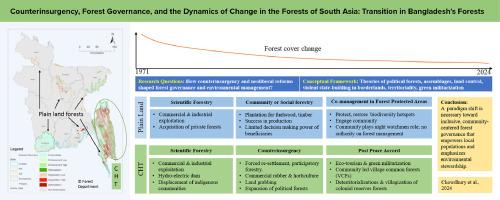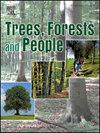Counterinsurgency, forest governance, and the dynamics of change in the forests of South Asia: Transition in Bangladesh's forests
IF 2.7
Q1 FORESTRY
引用次数: 0
Abstract
Since the end of the Cold War, attention has increasingly focused globally on the nexus of conflict, natural resources, and governance, particularly in forested regions. This paper presents a comprehensive historical and comparative analysis of forest and biodiversity loss in Bangladesh over the last 50 years, attending to the impacts of counterinsurgency in the Chittagong Hill Tracts (CHT) and governance changes in the plains. Drawing on Peter Vandergeest and Nancy Peluso's seminal concept of “political forests,” the study critically analyzes how counterinsurgency, state-led development, and green militarization in the CHT, alongside neoliberal development, commercialization, and land grabbing in the plains, have reshaped forest governance and territorial control in the country. The analysis reveals that counterinsurgencies in the CHT, driven by domestic priorities and strategic interests, expanded colonial-style territorial control over forests, thereby exacerbating biodiversity loss. In the plains, neoliberal governance has promoted forest degradation through commercial exploitation and state-sanctioned land grabbing, with economic growth being pursued at the cost of environmental sustainability. This paper presents a critique of both militarized and neoliberal approaches to conservation, demonstrating how these models prioritize political and economic agendas over ecological integrity and local community needs. In conclusion, the study advocates a paradigmatic shift toward inclusive, community-centered forest governance that empowers local populations and emphasizes environmental stewardship, challenging dominant state-centric and market-driven approaches to forest management.

反叛乱、森林治理和南亚森林的动态变化:孟加拉国森林的转型
自冷战结束以来,全球的注意力越来越集中于冲突、自然资源和治理之间的关系,尤其是在森林地区。本文对过去 50 年孟加拉国的森林和生物多样性损失进行了全面的历史和比较分析,关注吉大港山区(CHT)的反叛乱活动和平原地区治理变革的影响。本研究借鉴彼得-范德盖斯特(Peter Vandergeest)和南希-佩鲁索(Nancy Peluso)开创性的 "政治森林 "概念,批判性地分析了吉大港山区的反叛乱、国家主导的发展和绿色军事化,以及平原地区的新自由主义发展、商业化和土地掠夺如何重塑了该国的森林治理和领土控制。分析表明,在国内优先事项和战略利益的驱动下,吉大港山区的反叛乱行动扩大了对森林的殖民式领土控制,从而加剧了生物多样性的丧失。在平原地区,新自由主义治理通过商业开发和国家认可的土地掠夺促进了森林退化,以环境可持续性为代价追求经济增长。本文对军事化和新自由主义的保护方法进行了批判,展示了这些模式如何将政治和经济议程置于生态完整性和当地社区需求之上。最后,本研究倡导向包容性、以社区为中心的森林治理模式转变,赋予当地居民权力,强调环境管理,挑战以国家为中心和以市场为导向的主流森林管理方法。
本文章由计算机程序翻译,如有差异,请以英文原文为准。
求助全文
约1分钟内获得全文
求助全文
来源期刊

Trees, Forests and People
Economics, Econometrics and Finance-Economics, Econometrics and Finance (miscellaneous)
CiteScore
4.30
自引率
7.40%
发文量
172
审稿时长
56 days
 求助内容:
求助内容: 应助结果提醒方式:
应助结果提醒方式:


